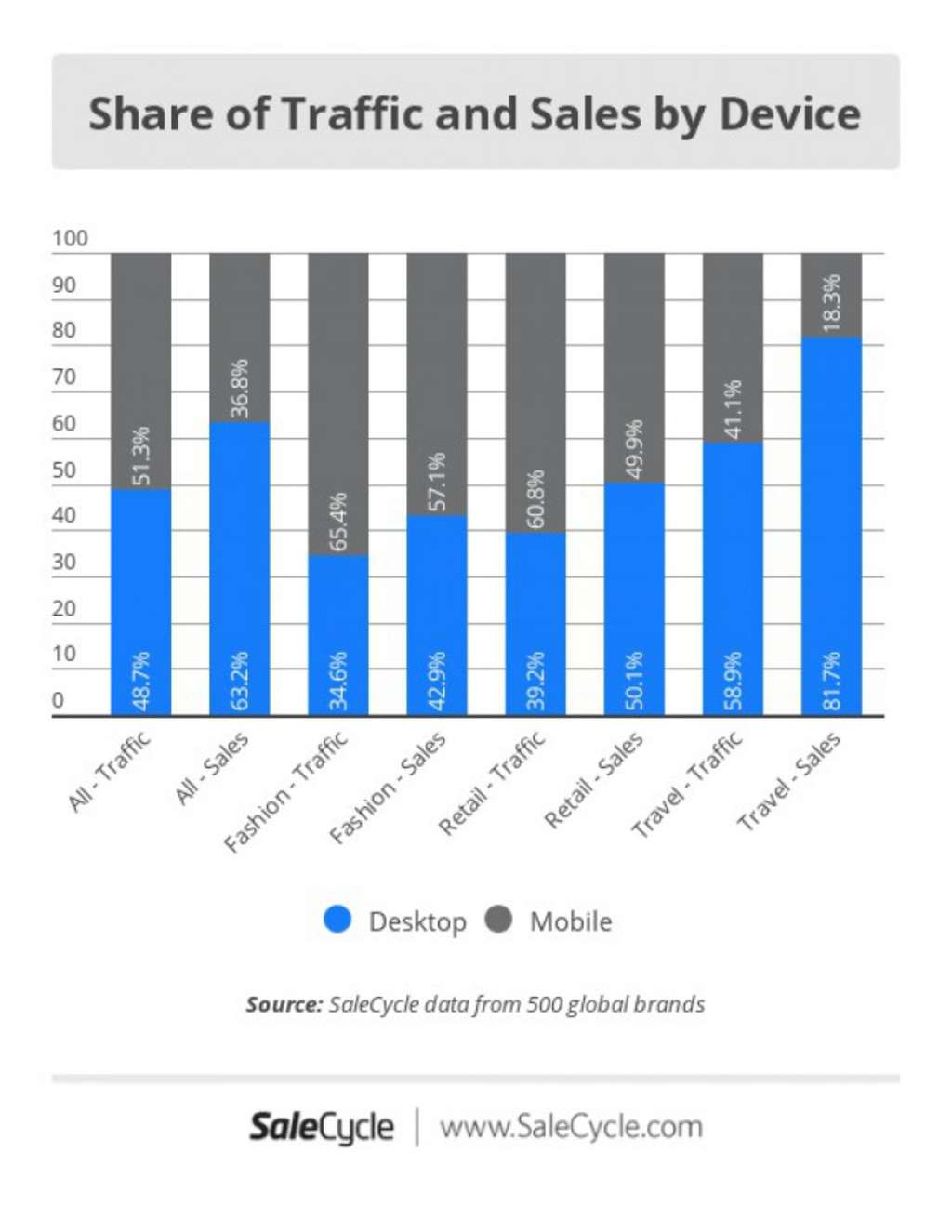Mobile is the Most Important Part of Your Hotel’s Guest Engagement Strategy – Here’s Why

In 2018, fashion retailers saw mobile purchases surge ahead of desktop signifying what will likely be a trend across industries (SalesCycle). Fifty-one (51%) percent of online fashion purchases were placed via mobile device, while desktop saw only 42.9%. In terms of demographics, a remarkable 75% of shoppers aged 18-34 bought clothes on smartphones compared with 51% of those aged 35-54. When it comes to booking travel, however, patterns look very different. Though 41% of travel research happens via mobile, just 18.3% of travel converts on mobile—a much lower percentage than other industries. Others sources, such as Phocuswright, report mobile bookings at up to 30%, notably still below average.
This disparity raises many questions about digital strategies in the hotel industry. The first of which is, of course, why aren't hotels converting on mobile? The industry is quick to say that a hotel stay is a high-consideration purchase, which is more likely to occur on desktop than mobile. But look at Carvana: for millennials shopping at Carvana, almost 30% complete the entire car shopping transaction via mobile—from finding a vehicle to financing—says Ryan Keeton, co-founder of the company (DigitalCommerce360). For other demographics, it's about 20%. Car buyers even schedule delivery of their vehicles via mobile app, and users report that Carvana delivers on the promise to make car-buying fun again. As much as it is a car dealer, Carvana is also a technology company, investing in car imagery platforms and AI technology to make the buying process more streamlined.
The takeaway: Highly complicated or expensive purchases can and will happen via mobile websites and apps; however, the user experience must be well designed and highly functional. Tech-forward companies across industries pave the way for consumers.
The second important question: does mobile or desktop really matter as long as hotels get direct bookings? According to Skift, the most important conclusion from the 2017 J.D. Power and Associates North America Hotel Guest Satisfaction Index Study was "Pay more attention to mobile." The report found that hotels that utilize mobile apps and functionality have higher guest satisfaction. Research has shown that people who use mobile shopping apps buy more than they might otherwise, and over 18 months, customers who downloaded the branded app of a retailer spent 30% more in stores (The Conversation). (Conversely, poor app performance, apps that load information too slowly or crash frequently tend to deter both online purchasing and in-person spending.) Once the booking is complete, the hotel website becomes obsolete. The mobile app, however, can follow the guest throughout their journey. Mobile functionalities allow hotels to increase room service sales, spa appointments, golf times, and other amenities—some estimate by as much as 20%. Mobile also improves customer service, allowing guests to skip front desk lines and request essential services, such as housekeeping, via two-way chat. Convenience counts. Consider that when Starbucks introduced mobile app ordering, which allowed guests to order and pay online then skip the physical line at the store, 20% of their transactions moved online.
The takeaway: While guests appreciate mobile booking capabilities, digital strategies must go further than the booking to reach guests throughout the journey.
Another essential question to ask about the mobile hotel experience is how to move guests toward mobile in a similar way as the fashion and retail industry? We want guests to do more than research via mobile. We want them to continue to engage throughout their entire lifecycle via mobile device, improving their experience (shorter front desk lines, location-based messages while on property, etc.) while also reaping operational benefits (more efficient interdepartmental communication, fewer burdens on the front desk, etc.). And guests want to use mobile as much as possible.
Hotels must invest in the user experience, upgrading, integrating, and adding the ideal functionalities for target audiences. Further, hotels that get ahead with mobile think through the entire guest pathway to leverage the mobile website, mobile apps, text and chat, and functionalities. This may include mobile check-in and check-out, mobile keys, two-way messaging, reservations, room service orders, and so forth. Every step of the guest journey at the property offers an opportunity to serve the guest better, engage them, and generate revenue. Creating and optimizing mobile experiences must necessarily be followed by promotion. While guests are keen to use mobile offerings, hotels have lagged behind other industries and guests won't assume the availability or benefits of mobile engagement with a property unless they are explicitly made aware and incentivized to use it.
The takeaway: A "build it, and they will come attitude" doesn't work for hotel guests. Not only must hotels give serious consideration to interfaces and functionalities, but promotion is also just as critical.
The 2018 Annual Customer Engagement Technology Study, sponsored by Hospitality Technology, found that guests want 24 different mobile functionalities and hotels are consistently providing just three of them. Over half of guests want to be able to make reservations, check-in and check-out via mobile, view property maps, read/post reviews, request service, retrieve bills, change/manage bookings, pay, receive and redeem coupons, book award travel, control guestrooms, choose rooms, and purchase/redeem gift cards. Eighty percent (80%) of hotels offer mobile reservations, but across all of these other categories, hotels are underperforming, meaning a far lower percentage of hotels are offering the mobile feature than the rate of guests who want it.
Guests want a better mobile experience than hotels have provided. Moving the needle toward not just more mobile bookings but also toward a better overall mobile guest experience—one that will follow the guest throughout the stay—requires better user interfaces, more functionalities, and marketing strategies that will give guests the awareness and confidence to use them.
About Runtriz™
Runtriz delivers magic moments utilizing an open guest service platform that enables guest service amplification. We strive to enhance both the staff and guest service experience to optimize their time. With over 2000 hotels in 120 countries covering 50 + languages, Runtriz has the knowledge and experience to support your hotels' digital and guest engagement goals. We help our partners increase guest service results be delivering what today's guests want. For more information, or to request a demo, please visit runtriz.com.
Flinn Flexer
Chief Operating Officer
+1 323-230-9727 x212
runtriz™

